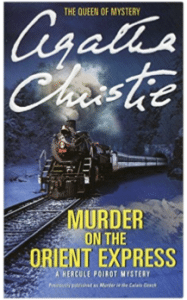 “I do not like your face, Mr. Ratchett.”
“I do not like your face, Mr. Ratchett.”
Author: Agatha Christie
Tucked in against blustery winds, spiraling fall leaves, and chilly downtown nights, I began reading my first Poirot aloud to my boyfriend, who secretly wants to be addicted to fiction (and just doesn’t realize yet that he totally is). Agatha Christie has made appearances in our lives before, including some audio books for long drives, and I have more than a passing familiarity with Miss Marple. However, the ingenious Belgian detective with the grand mustache, one world-famous Poirot, remained aloof to both of us. Instead of starting at the beginning, we dove instead into book ten in the Hercule Poirot series, Murder on the Orient Express because hey, go classic or go home.
These novels, as with the Miss Marple series, do stand on their own well. One gets the sense that the stories link in character development, and research has lead me to understand that as with Miss Marple, Poirot has a retune of returning supporters. Nevertheless, the gist of Poirot’s strong personality and driven intellect is instantly in evidence.
As the story begins, the Orient Express slows down, struggling under an immovable blanket of snow, and Poirot makes an unprecedented move by disregarding a fellow passenger’s entreaties for his protection. Mr. Ratchett, seemingly polite yet with a certain something of evil in his face, is convinced that he is to be murdered, and wants Poirot’s help in finding the assailant before it is too late. After being coldly turned aside by Poirot, Rachett ends up stabbed to death that very night. With the train now stranded and a glut of suspicious characters onboard, Poirot must unravel the mystery from the beginning. Who was Mr. Ratchett really and what drove the killer (or killers) to leave so many clues and stab so frantically?
The narrative falls into a question and answer pattern. Poirot runs the gauntlet of passengers, revealing the inadequacies of their stories and the consequential, tiny details. Suspicions are ever shifting and while Poirot remains attuned to the undercurrent, readers find themselves at turns baffled, shocked, intrigued, scheming, certain, defeated, and generally engrossed. This who-dunnit is particularly more complicated then Christie’s usual fare, which is saying quite a lot. While the boyfriend and I had some heated discussions, and interrupted each other with commentary on the clues, in the end despite our best deductions, Poirot revealed the true majesty and intricacy of the international crime.
The only element that deviated from my previous experience with Christie was the cut-and-dried manner of narrative. Characterization and writing style are basic, perfunctory. While this helps us hone into the mystery, it leaves Poirot and friends ultimately mysteries themselves. The straightforwardness of the writing mimics the terseness of serious investigation, yet somehow keeps the elegant sweep of bestial train from become fully real. The constant French assertions . . . well let’s just say that one feels pretty foolish attempting to read words out loud from another language (I admit, I don’t know anything in French beyond how to order coffee and say hello).
Short and fascinating, Agatha Christie’s Murder on the Orient Express ultimately lives up to its legacy as stellar, hard to solve crime fiction. Suitably addicted to the intellectual stimulation and the twists and turns of a brilliant mind, Poirot continues to be in our reading list and the nighttime investigations into murder most foul have only just begun. We’re now on to Halloween Party, a later Poirot tale. Recommended.
- Frances Carden
- Book Vs Movie: The Shining - April 6, 2020
- Thankful For Great Cozy Mysteries - December 13, 2019
- Cozy Mysteries for a Perfect Fall - October 20, 2019


